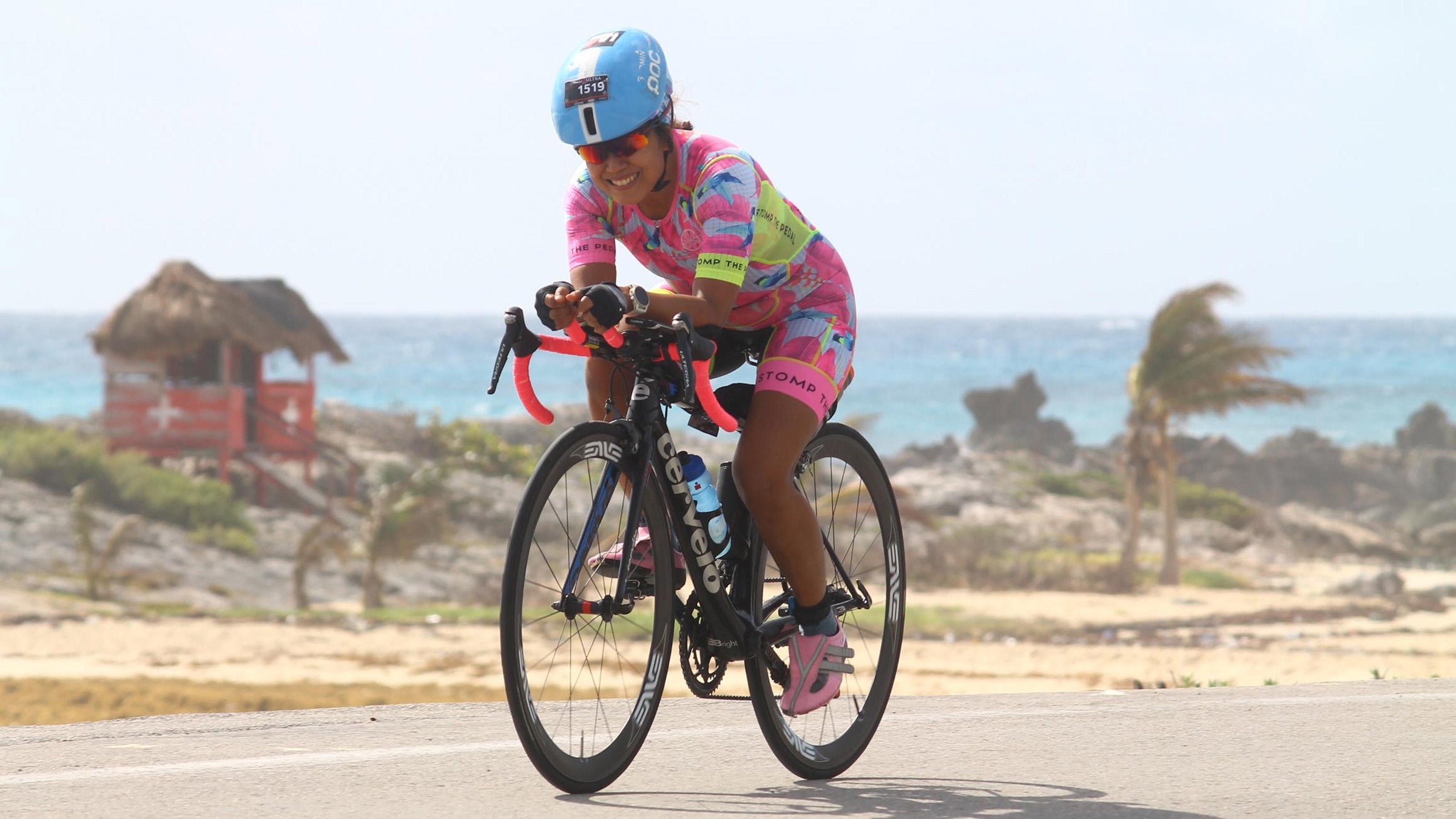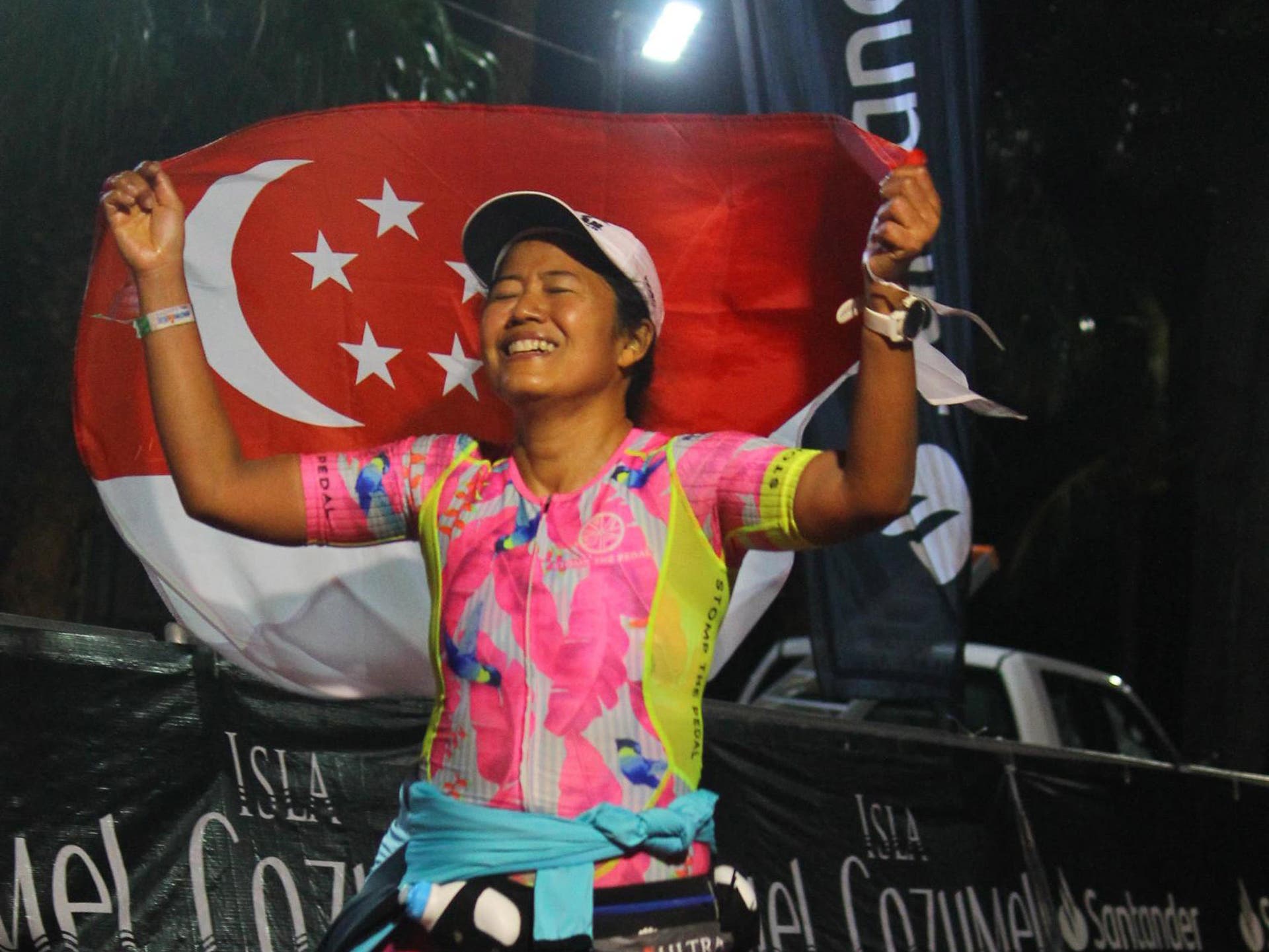One (Crazy, Pandemic) Year, Three Ironmans

Irene Magdalena at Ironman Cozumel. (Photo: provided by Irene Magdalena)
I had thought that racing one single Ironman in 2020 was lucky—and a display of resilience. Then, in Tallinn, Estonia, where I participated in my only event of the year at Ironman Tallinn in August, I met Irene Magdalena Alisjahbana.
Alisjahbana, 49, is an elementary teacher based in the Netherlands but originally from Singapore. In March, just before the pandemic reached its tipping point, she raced Ironman New Zealand. For most, racing in Tallinn and New Zealand—events that are literally 11,000 miles apart, by the way—would be enough for the year, but not for Alisjahbana. Even with an ongoing global pandemic, she had different plans.
Her goal was to race three Ironmans this year and complete Ironman’s legacy program, an option that allows triathletes to race in Kona without competing for a slot. To achieve “the Legacy,” you need to have at least 12 full Ironman races under your belt. Alisjahbana’s ultimate goal is to race in Kona in 2021, a personal way to celebrate her 50th birthday. To hit that deadline this year would require some creativity in the midst of a pandemic.
But she did it. On Nov. 22, Alisjahbana finished Ironman Cozumel in 16 hours and 43 minutes: Her third event of the year and her 12th since November 2016. In a nice parallel, her first Ironman had been in Cozumel, and now, four years later, her project was accomplished right where it had begun.
“It was a miracle that I got to finish three IMs this year despite COVID-19 and three canceled races (two Ironmans and one ITU),” she said. “I saw an opportunity to race Cozumel last minute, though my preparation was not the best because of quarantine and lockdown. Getting there was half the battle, and it zapped a lot of energy.”
The other events she had booked for 2020 were Ironman Copenhagen and Ironman Austria—both ended up canceled for 2020. Tallinn materialized at the last minute as a deferral option in place of Copenhagen. Ironman Austria is now her first goal for 2021.
Just getting to the races was no joke. Alisjahbana had to juggle flight and ferry cancellations, plus waiting up to seven hours to catch chartered flights. In Estonia, she even self-isolated for two weeks before the event to comply with the health and safety requirements.
“It is part of the traveling package,” she said. “You’ve got to be prepared for anything and just embrace it. I always set positive intentions and then just let the universe manifest. I try to do everything that is in my control, but sometimes things don’t go your way. You just need to move on to the next race and keep trying. I like that IM racing is like crisis management. If you’re not calm, you will lose it.”

Traveling and racing in a global pandemic naturally brings other challenges, including staying safe and healthy.
“[At races] I was staying in an apartment by myself, so I was not in contact with anybody. Then, of course, I wear face masks and use hand sanitizer,” she said. “I also train alone, and in the Netherlands, I was lucky I could go outside during lockdown. The only limit was the weather, but it was really great this year.”
And despite getting close to two positive COVID cases (one work colleague and her husband), she’s always tested negative. “I didn’t need to travel to get COVID,” she said of her husband’s positive test.
As if things weren’t hard enough, she’s also been a vegan athlete since 2016—and she eats 80% of her food raw (in the form of smoothies, salads, and dehydrated foods like kale crackers).
“It takes a lot of effort and planning, and conscious eating, but it’s really worth it,” she said. “I started to be vegan when I wanted to do an Ironman. I had excess weight, and I didn’t want to get injured. I lost over 30 pounds after one year of going vegan, and it also helped me run faster, and recovery is automatic. It’s a miracle. You can’t advocate the plant-based diet until you try it. I don’t think twice about doing three IM in one year because I know my body can cope with it.”
To those who ask her how she can afford all the race fees and travel costs, she sometimes jokes that she doesn’t “drink coffee or alcohol.” In reality, there is a lot of planning and budgeting behind the scenes. But, she says, she doesn’t count every single penny.
“I just try to limit the costs, I don’t go extravagant, and I work within my means,” she explained. “I look at it in the long haul. I wanted to do 12 IMs and so budgeted for that, rather than for one race. For Cozumel, the flights were cheap, the accommodation affordable, and the same for Tallinn. I’m happy my partner [Wouter, 54, a chief financial officer] supports me, and though my savings is emptying right now, I still have a job, and that’s important!”
The other fundamental support, said Alisjahbana, comes from her children Max (15) and Nick (14). “They don’t say ‘Don’t go, mama.’ That would be hard to hear. They actually support me, and that makes me want to chase my dreams,” she said.
Alisjahbana has been racing triathlons since 2010, when she was still living in Singapore. She did her first 70.3 in 2015 (Busselton, Australia), and in April 2016—during a round-the-world trip with her family—she had the idea of trying her first full Ironman.
“I was training in South Africa, and I saw the people competing the full Ironman in Port Elizabeth,” she said. “Out of the blue, I thought I wanted to do that race. I asked a couple of friends, and they said I could do it. So I thought I must be able to do it!”
After having qualified for the 70.3 World Championships in 2016 (held in Australia), she thought of going the extra mile—even though she hadn’t completed even one full-distance yet.
“[The 70.3 WC] was just an amazing experience that made me want to do Kona as well,” she said. “I knew I could have worked myself to [Kona]. It may be through a different route, but I knew I could get there. I found out about the legacy program, and I decided that was the only way for me. Unless I would win my age group at 75 years old, which is another goal that I have.”
From there, the whole project unfolded quickly. In November 2016, she finished Cozumel for the first time in 15 hours and 42 minutes; in 2017, she raced IM Brazil in May (14:49), Maastricht in August (14:54), and then Argentina in December (16:03). The following year she ran IM Boulder in June (16:29), and though she DNF’ed in Barcelona in July, she then signed up and raced in Malaysia in November (16:49) as a rebound. In 2019, Alisjahbana ran IM South Africa in April (15:53), she DNF’ed in Switzerland in July (one minute above the bike cut-off time), Copenhagen in August (14:58), and then she took her revenge in Barcelona, where she has set her current PB on the long course in 14 hours and 32 minutes.
Then came 2020. Everyone else would have thought that the dream of chasing 12 IMs would need to be postponed. But not Alisjahbana. She finished Ironman New Zealand in 16 hours and 38, Tallinn in 16 hours 16, and Cozumel in 16 hours 43. Job done.
What keeps her motivated? “Training and going to beautiful places,” she said. “I also do it now because I can. I may not be able to do it later, or when my finances will not allow me. Right now, I can, I enjoy it, and I love it. That’s why I do it.”